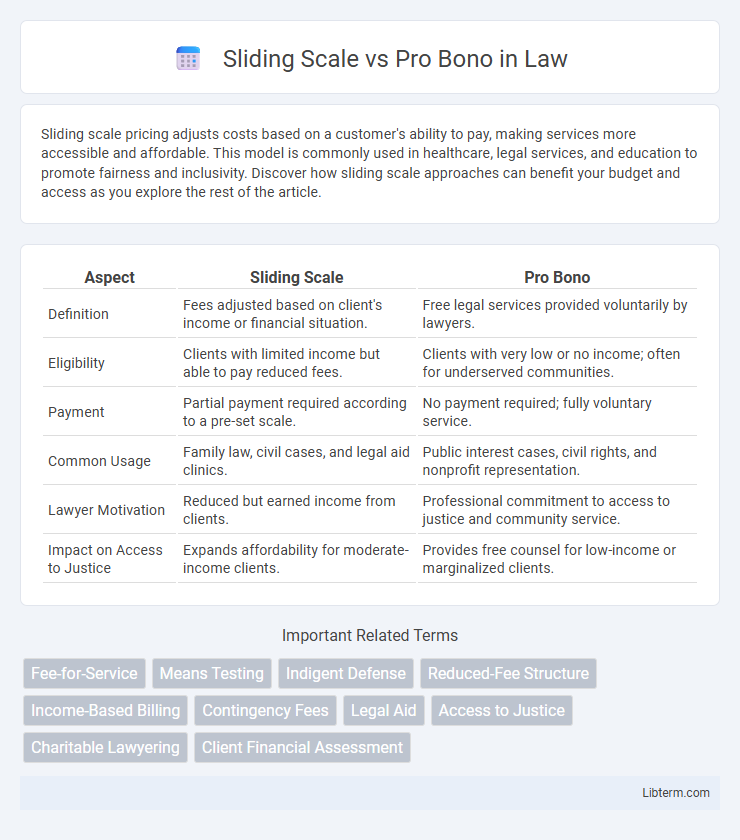Sliding scale pricing adjusts costs based on a customer's ability to pay, making services more accessible and affordable. This model is commonly used in healthcare, legal services, and education to promote fairness and inclusivity. Discover how sliding scale approaches can benefit your budget and access as you explore the rest of the article.
Table of Comparison
| Aspect | Sliding Scale | Pro Bono |
|---|---|---|
| Definition | Fees adjusted based on client's income or financial situation. | Free legal services provided voluntarily by lawyers. |
| Eligibility | Clients with limited income but able to pay reduced fees. | Clients with very low or no income; often for underserved communities. |
| Payment | Partial payment required according to a pre-set scale. | No payment required; fully voluntary service. |
| Common Usage | Family law, civil cases, and legal aid clinics. | Public interest cases, civil rights, and nonprofit representation. |
| Lawyer Motivation | Reduced but earned income from clients. | Professional commitment to access to justice and community service. |
| Impact on Access to Justice | Expands affordability for moderate-income clients. | Provides free counsel for low-income or marginalized clients. |
Introduction to Sliding Scale and Pro Bono Services
Sliding scale services adjust fees based on a client's income, making professional help more affordable while maintaining payment flexibility tailored to individual financial situations. Pro bono services provide free assistance, typically offered by lawyers, medical professionals, or counselors, to those who cannot afford standard fees, ensuring access without any cost barrier. Both sliding scale and pro bono models aim to increase accessibility to essential services for low-income or underserved populations.
Understanding the Concept of Sliding Scale Fees
Sliding scale fees adjust legal service costs based on a client's income, making representation more affordable while maintaining some payment. This flexible pricing model contrasts with pro bono work, which is offered entirely free, usually reserved for clients with little to no ability to pay. Understanding sliding scale fees helps clients access quality legal aid without the stringent eligibility requirements often tied to pro bono services.
What Does Pro Bono Mean in Legal and Medical Fields?
Pro bono in legal and medical fields refers to professional services offered voluntarily and without payment to individuals or groups unable to afford standard fees. In law, pro bono work involves lawyers providing free legal representation or advice to underserved populations to promote access to justice. In medicine, pro bono services include healthcare professionals delivering free medical care or consultations to improve community health and address disparities.
Key Differences: Sliding Scale vs Pro Bono
Sliding scale fees adjust legal service costs based on a client's income, making representation more affordable for individuals with limited financial resources. Pro bono services are provided entirely free of charge by lawyers committed to offering legal assistance to those who cannot afford any payment. The key difference lies in payment structure: sliding scale maintains some level of client contribution, while pro bono offers complete waiver of fees.
Benefits of Sliding Scale Services
Sliding scale services provide flexible payment options based on a client's income, making mental health care and professional services more accessible to a broader population. This approach reduces financial barriers without entirely eliminating costs, encouraging accountability and sustained service use. Sliding scale fees benefit both clients and providers by promoting inclusivity while maintaining service sustainability.
Advantages of Pro Bono Support
Pro bono support offers the advantage of providing free legal or professional services to individuals and communities who cannot afford standard fees, ensuring access to justice and essential expertise regardless of financial status. This approach strengthens community trust and fulfills ethical obligations for professionals, fostering social equity and inclusion. Pro bono work often leads to meaningful impact by addressing systemic inequalities and supporting vulnerable populations directly.
Eligibility Criteria for Sliding Scale and Pro Bono Programs
Sliding scale programs typically require applicants to provide proof of income and household size, with fees adjusted according to a percentage of their earnings, making services affordable based on financial capacity. Pro bono programs, on the other hand, often prioritize individuals with severe financial hardship, including those below the federal poverty line or experiencing homelessness, with eligibility sometimes extended to marginalized groups or victims of specific injustices. Both approaches aim to increase access to services, but sliding scale models offer a graded fee structure while pro bono services are usually free for qualifying participants.
Choosing Between Sliding Scale and Pro Bono Assistance
Choosing between sliding scale and pro bono assistance depends on income level and case complexity, as sliding scale fees adjust based on client earnings while pro bono services are fully free. Clients with limited but some income often benefit from sliding scale options, gaining access to affordable legal aid without completely unpaid commitments. For those with severe financial constraints, pro bono work provides essential support, especially in high-need areas like criminal defense, family law, and immigration.
Impact on Professionals and Service Providers
Sliding scale fees enable professionals to adjust charges according to clients' income, promoting financial accessibility while ensuring sustainable compensation for service providers. Pro bono work involves offering services entirely free of charge, enhancing professional reputation and community impact but potentially limiting income stability. Both approaches foster social equity; sliding scales balance financial viability with client support, whereas pro bono emphasizes altruism and public service.
Conclusion: Which Option is Right for You?
Choosing between sliding scale and pro bono legal services depends on your financial situation and the complexity of your case. Sliding scale fees offer flexible payments based on income, making quality representation accessible for those with limited funds. Pro bono services provide free legal aid but may have stricter eligibility criteria and limited availability, so assessing your needs and resources is crucial to determine the best fit.
Sliding Scale Infographic

 libterm.com
libterm.com